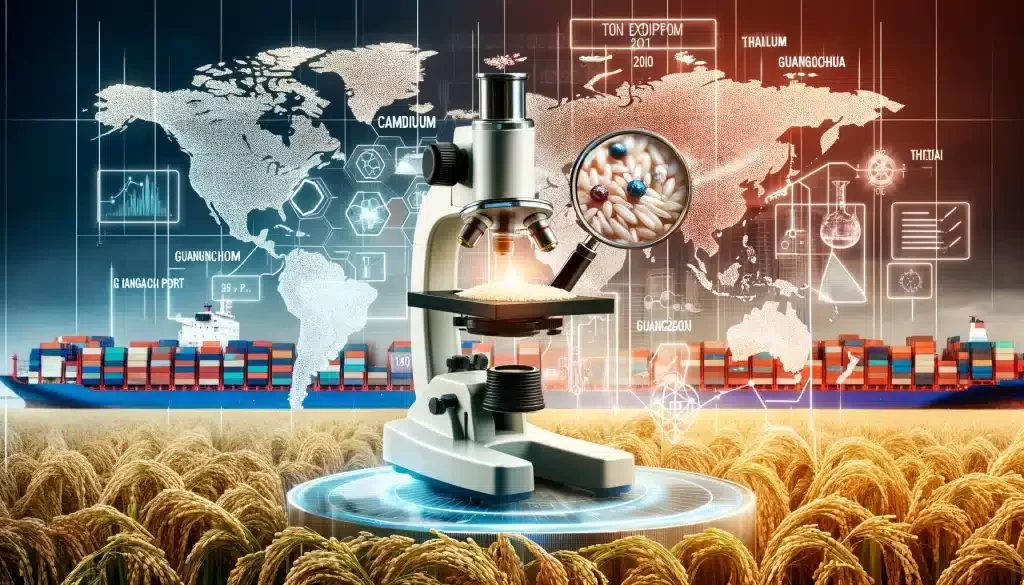Analysis Of Cadmium Content In Imported Rice From Thailand
Evaluating cadmium levels in Thai rice imports to ensure food safety, guiding policy decisions, and highlighting the importance of rigorous testing.
At present, my country’s rice imports from abroad are constantly increasing, especially the import of rice produced in Thailand is increasing year by year. In order to understand the cadmium content in imported Thai rice, we analyzed the cadmium content in 78 batches of 377,734 tons of Thai rice imported from Guangzhou Port in 1995.
Introduction to Rising Rice Imports and Food Safety Concerns
In recent years, the global trade landscape has experienced a marked shift, with countries increasingly relying on imports to meet their domestic demands for food. Among these commodities, rice stands out as a staple food for a significant portion of the world’s population, underscoring the importance of its safety and quality. This trend is particularly observable in my country, where there has been a continuous and notable increase in rice imports. Specifically, rice imported from Thailand has seen a year-on-year increase, reflecting the growing dependence on foreign rice to supplement domestic supply. In light of this trend, it becomes crucial to monitor and evaluate the safety standards of these imports, particularly concerning contaminants such as cadmium, which poses significant health risks.
The Health Risks Associated with Cadmium in Food
Cadmium is a heavy metal that is naturally present in the earth’s crust and can be introduced into the food chain through various environmental pathways. Its presence in food products, especially rice, is a matter of concern due to its potential to cause kidney damage, bone frailty, and other serious health issues upon prolonged exposure. Therefore, the analysis of cadmium content in imported rice is not just a regulatory requirement but a necessity to ensure the health and safety of consumers.
In an effort to gauge the safety levels of the Thai rice being imported, a comprehensive analysis was undertaken on 78 batches, totaling 377,734 tons, which were imported through Guangzhou Port in 1995. This study aimed to determine the cadmium content in these imports, thereby providing a basis for assessing their compliance with national and international safety standards.
Objective and Methodology of the Cadmium Content Analysis
The analysis employed state-of-the-art techniques and methodologies to ensure accuracy and reliability of the results. The samples were collected in accordance with standardized protocols, and the cadmium content was measured using techniques that are recognized globally for their precision in detecting trace elements in food products. The outcomes of this analysis are pivotal, as they offer insights into the extent to which imported Thai rice meets the safety criteria set forth by health and regulatory agencies.
Implications of the Analysis for Policy and Supply Chain
Furthermore, the findings of this study are instrumental in guiding policy decisions related to food imports. They serve as a critical input for regulatory bodies tasked with safeguarding public health, enabling them to make informed decisions regarding the continuation, modification, or enhancement of import regulations and safety checks. Additionally, the results have implications for stakeholders across the supply chain, including importers, distributors, and retailers, by informing them about the quality and safety of the products they handle.
Conclusion: The Importance of Ensuring Safe Food Imports
In conclusion, the analysis of cadmium content in imported Thai rice through Guangzhou Port highlights the essential intersection between food safety, public health, and international trade. It underscores the need for continuous monitoring and stringent quality control measures to ensure that imported food products meet the required safety standards. As the global food trade continues to expand, such studies become increasingly important in ensuring that the benefits of trade do not come at the expense of consumer health and safety. This proactive approach to food safety is vital in maintaining public trust in imported food products, thereby supporting the sustainable growth of international trade in agricultural commodities.
For futher details of this article and research, feel free to contact our team for assistance.
Original research was done by Huang Peng
About ETprotein:
ETprotein, a reputable plant protein vegan protein Chinese factory manufacturer and supplier, is renowned for producing, stocking, exporting, and delivering the highest quality organic bulk vegan protein and plant proteins. They include Organic rice protein, clear rice protein, pea protein, clear pea protein, oat protein, watermelon seed protein, pumpkin seed protein, sunflower seed protein, mung bean protein, peanut protein, various of plant peptides etc. Their offerings, characterized by a neutral taste, non-GMO, allergen-free attributes, cater to a diverse range of industries. They serve nutraceutical, pharmaceutical, cosmeceutical, veterinary, as well as food and beverage finished product distributors, traders, and manufacturers across Europe, USA, Canada, Australia, Thailand, Japan, Korea, Brazil, and Chile, among others.
ETprotein specialization includes exporting and delivering tailor-made protein powder and finished nutritional supplements. Their extensive product range covers sectors like Food and Beverage, Sports Nutrition, Weight Management, Dietary Supplements, Health and Wellness Products, and Infant Formula, ensuring comprehensive solutions to meet all your protein needs.
As a trusted company by leading global food and beverage brands and Fortune 500 companies, ETprotein reinforces China’s reputation in the global arena. For more information or to get a free sample of their protein products, please contact them and email sales(at)ETprotein.com today.














